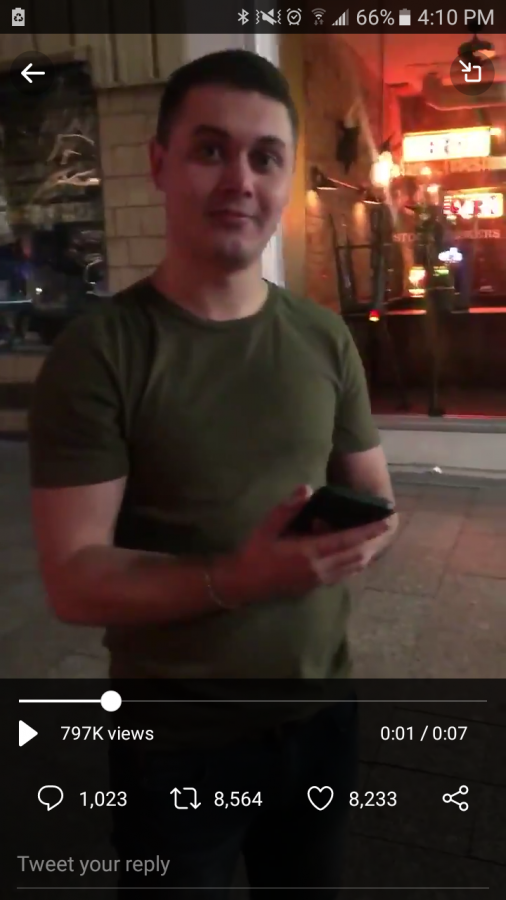Correction: a previous version of this article incorrectly stated that a senate bill amending hate crime passed the senate, the bill is still in the senate and will receive a committee hearing from the chamber on Thursday. The article has been updated to include this information.
One woman’s report to the police may have been helpful in locating the suspect of an assault which appears to have been a hate crime. On Saturday night, a man filmed his assault outside a popular university hang-out bar in downtown Salt Lake City.
Sal Trejo and his friends were waiting outside the bar when a man began harassing them, Trejo told the Associated Press. On Sunday night, Trejo posted a video of the assault that went viral on Twitter. “My friends and I were assaulted by this homophobic man in downtown Salt Lake City last night” the post read.
The video shows a man asking Trejo if he is gay and when he responds that he is, the man is seen throwing a punch at Trejo, who is holding the camera. On Monday morning, the SLCPD posted on Twitter that they had made contact with the suspect, whom they wrote was “cooperating fully with the #investigation.”
While the SLCPD has not commented on how they were able to locate and contact the suspect, the reports of Sheridan Smith may have been a key. Smith told The Daily Utah Chronicle in an interview that she recognized the man in the video that was posted to social media on Sunday night and immediately contacted the police. She said that she was able to provide the department with the man’s phone number.
Smith said she and her friends exited a bar located at approximately 300 South Main St at around 1:20 a.m. on Saturday when they were accosted by this same man, who she said identified as “Carlo.” The man asked the group if they smoked. Smith said she told him they did not, after which he began hitting on her.
She said the man who called himself Carlo told her he was 24. She said that she politely rejected him because she is “10 years older” than him. However, when Smith tried to walk towards their Lyft with her friend, the man would not stop talking to her.
She said Carlo told her he was from California and that he worked on a marijuana farm. “He kept bugging me,” she said, recounting that although he did not act violently, she felt “unsafe” and “uncomfortable.” The man, she said, asked her if he could get her a Lyft and requested she provided him with her home address.
Smith said that she did not give him an address and called her own Lyft since the one she had meant to take had already left with her friend. The man asked her for her number and snatched her phone from her because, she said, he did not believe she would give him a “real number.” She said he then called her phone while holding it to “make sure” she wasn’t lying to him.
Smith said he tried to walk her to the Lyft once it arrived but she avoided him by texting a friend to call her while she walked to the car. She said after finding out about the assault she wondered what would have happened if she had she not been so gentle in her rejection. Smith said that she wondered what would have happened “if he had gotten that mad at [her].”
The apparent hate crime against Trejo comes at a time when Utah’s hate crime laws are under scrutiny for lacking teeth. The state’s lawmakers have continuously attempted to enhance penalties for hate crimes through amendments to the current law that have failed to result in a single conviction.
A new bill that attempts to amend the state’s hate crime laws has been introduced to the Senate by Sen. Daniel Thatcher, R-West Valley City and will be heard before the Senate Judiciary, Law Enforcement and Criminal Justice Committee on Thursday.
Equality Utah, a non-profit that advocates for the LGBTQ rights, retweeted Trejo’s post saying that they were “deeply concerned” about the video’s contents and that they would work with Trejo and law enforcement to “ensure that justice prevails.”
Sen. Derek Kitchen, D-Salt Lake City, Utah’s only openly gay member of the legislature, also condemned the actions on Twitter, stating that “It’s time for the UT Legislature to act on hate crimes legislation.” Kitchen’s husband Moudi Sbeity, who owns a Mediterranean restaurant whose pride flag was vandalized last week, took to social media as well, stating that Saturday’s assault was proof that “the LGBTQ+ community” should be included in Utah’s hate crime legislation.


